Roz Morris's Blog, page 95
June 24, 2012
Who will read my book?
 Last week my post – as you may have seen – was a letter to a writer who was losing confidence. Thank you all for your comments and tweets – I had no idea it would be so widely appreciated.
Last week my post – as you may have seen – was a letter to a writer who was losing confidence. Thank you all for your comments and tweets – I had no idea it would be so widely appreciated.
I also had a comment from Steven Lyle Jordan, who felt I’d glossed over some hard truths. And I agree we should think about them.
Here’s what Steven said:
I’m surprised that the letter managed to miss an all-important question which I believe all novelists ask themselves, whether they admit to it or not: Will anybody care?
I don’t believe writers write in a vacuum. If they write, it’s because they want someone to read what they’ve written. If no one wants to read your book–if no one will buy it–it does two things to a writer: It breaks down a great deal of the confidence that was built up in order to write it; and it forces the writer to consider whether all that effort, no matter how good, no matter how enjoyable, was worth it.
After writing a number of novels, I firmly believe that I know how to do it right. But lack of interest and lack of sales does more to discourage me, and prevent my bothering to write the next novel, than all of the other points in that letter combined. (It still may prevent me from writing the novel I’m actually developing right now; at any moment, I might “come to my senses” and pull the plug.) If that letter had been written to me, and it did not touch upon that point, it would be essentially worthless to me.
Who will care about what we’ve written?
From time to time I hear a writer wistfully bleat: ‘the good novels rise to the top’. What rubbish. The novels that rise got lucky or were marketed smartly. We certainly need more ways to find fairy godmothers for deserving books (and I’ve talked about quality control and recognition recently here).
Steven continues:
You might have also asked Lucy if she was comfortable with the state of publishing, the industry turmoil she’d be injecting herself into, the multiple channels of the ebook industry she may have to master, the likelihood that ebook piracy would rob her of some amount of possible profit, etc. All of that has been known to sink many a prospective author before they’d sailed.
First, piracy. Discover the atom and someone will make the bomb. We invented ebooks and we got piracy. Anyone who argues that piracy is flattering or beneficial should be strapped down while their house is burgled. Steven, I agree. It’s a shark’s world out there. And it’s going to get more bloody.
Now authors will pay to make their books better, we’ve got critters willing to fleece them for editorial services of dubious quality (in an attempt to avoid this, here are my tips on choosing a good critique service).
We have authors aching to be recognised, and we have schemes charging astonishing fees for awards and seals of approval. On the law of averages, many of these books will be rough and a glance at the opening will be enough to tell the reviewers that. The reviewer only needs to read for as long as the book is up to standard. Some sort of fee seems fair because time and expertise aren’t free. But many of these schemes charge several hundred dollars a pop – for what must on average be ten minutes’ work.
Goldrush
While we dodge the rip-offs, we’re giddying from goldrush to goldrush. Last December, it was free Kindle books. Now people are so used to piling free books into the infinitely deep pockets of their Kindles they never look at them.
Right now we’re dancing can-cans about Kickstarter. How long before some investor makes a mighty fuss that all they got was a lousy T-shirt? There will be a sacrificial lamb – whether a crook or a well-intentioned author – and that will be the end of it.
Another point is simmering under Steven’s comment, and it’s worth considering. Never has the writer’s livelihood been more precarious – and that’s even for those who have ‘broken in’. About 20 years ago, a publisher’s advance would realistically fund you to write a book. Now you have to write the first book for nothing and if you get an advance for the second it’s pitiful.
What’s more, publishers seem to do very little for the percentage you hand over. For most writers the editorial services have been cut to minimal levels. And recently the estimable publishing guru Jane Friedman advised that if you want your breakout book to be a hit (and thus to increase your chances of having a traditionally published career at all), you should hire your own publicist. Yes, even if you have a publisher. In which case, I have to ask, what is the publisher doing for you?
So, Steven, I agree it’s not rosy at all, especially if writing is your livelihood.
Anarchy
Right now, it’s anarchy. We are all trying to thrash our way to a better spot in the food chain – writers, publishers, editorial pros, agents, investors, teachers, tech companies, retailers, distributors, conference organisers. But people want to write and people want to read. That means we have an industry – and even a way of getting our work out. Who will be making a decent wage from it? Can emerging writers still cling to the dream of supporting themselves only by their novels? Perhaps those days are gone. Or perhaps the publishing economy is about to become a lot more equitable.
Maybe at the moment, we have to see our publishing dreams as separate from our writing dreams. Our writing dreams have always been the same – write a book that somehow matches up to our hopes for it. Do whatever we can to honour the reader and the artform. Make good work, and never stop trying to be better. Sit out the bloodbaths and keep writing. Which is what started all this anyway.
Thanks for the pics 05com and alq666
What do you think?
The first edition of my newsletter is out now, including useful links and snippets about the next Nail Your Novel book! You can read it here and you can add your name to the mailing list here.








June 21, 2012
Why we need stories – tales of the earthquake at Authors Electric
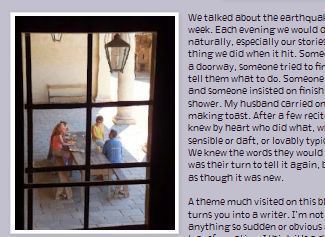 We know why we write. It’s a natural inclination that some of us have to express ourselves on the page. But what might bring out the storyteller in non-writers? This incident from my recent trip to Italy turned a disparate group of friends into campfire tale-tellers – it’s on the Authors Electric blog now.
We know why we write. It’s a natural inclination that some of us have to express ourselves on the page. But what might bring out the storyteller in non-writers? This incident from my recent trip to Italy turned a disparate group of friends into campfire tale-tellers – it’s on the Authors Electric blog now.
Have you had an experience that turned you and your non-writing friends into storytellers? Tell your tale in the comments here








June 19, 2012
‘I wanted music that was angry and soulful, both at the same time’ – The Undercover Soundtrack, Zoe Sharp
 My guest this week writes to everything from Gregorian chant to grinding rock. For her latest novel in her crime series, she wanted to explore themes of regret and loss – and she looked for resentful, raw emotional songs to echo the pressures in her character’s life. She is Zoe Sharp, the novel is Fifth Victim: Charlie Fox book nine and she is on the Red Blog with its Undercover Soundtrack.
My guest this week writes to everything from Gregorian chant to grinding rock. For her latest novel in her crime series, she wanted to explore themes of regret and loss – and she looked for resentful, raw emotional songs to echo the pressures in her character’s life. She is Zoe Sharp, the novel is Fifth Victim: Charlie Fox book nine and she is on the Red Blog with its Undercover Soundtrack.








June 18, 2012
Letter to a writer who is losing confidence
 ‘My friend Lucy has always loved writing but recently she’s lost confidence. I’ve just bought her your book Nail Your Novel for her birthday, but I wondered if you’d have time to write something in it to give her a little encouragement? Yours, Diane
‘My friend Lucy has always loved writing but recently she’s lost confidence. I’ve just bought her your book Nail Your Novel for her birthday, but I wondered if you’d have time to write something in it to give her a little encouragement? Yours, Diane
I had this lovely email a few weeks ago. I started to scribble a few lines and it turned into a bit of a campaign. So I asked Lucy and Diane for permission to reproduce it here
Dear Lucy
Diane tells me you’ve found yourself writing a novel. Somehow writing sneaks up on a lot of us like that. A bit of typing here, an hour or two musing about characters and a story, and before we know it we have a regular appointment with the page.
She says you’re not always finding it easy. Well, I hope my book will hold your hand some of the way, but here are a few other things I’d say.
All writers doubt themselves
Will we have enough ideas? Will we be able to make the story work? Will our book live up to what we want it to be? And what is that anyway?
Writing a novel is a big job. You have a heck of a lot to get right. Plot, character, pace, theme, structure, description, logistics, language. If it’s your first novel, you’ve also got to learn the craft too. If you take it at all seriously (and thank goodness you clearly do), you’re bound to have wobbly times. Most professional novelists take at least 18 months to get a novel right – and they know what they’re doing.
Take your time and listen to your instincts. Ignore the relatives and friends who are making impatient noises about when it will be ready. They have no idea how much work is involved.
Your path won’t be the same as anyone else’s
… but reading about others’ helps. Writing is a self-directed quest, guided by the books you read and the book you want to do justice to. Plus, of course, whatever’s going on in your life – and that’s under nobody’s control at all. Enjoy your random, rambling learning process because it’s what will help you define your style, your way.
 You often don’t realise how far you’ve come
You often don’t realise how far you’ve come
Sometimes it helps to look back at what you wrote a year ago – or two – and compare it with how you’d do it now. Even, ask yourself what you did to make the difference – then you’ll see how your haphazard experiments are taking you somewhere.
Your style and voice
Have you got a style yet? Is your voice strong enough? This develops with mileage. There are no shortcuts, but until you’ve got it, play. Find a writer whose voice you adore and try ‘being’ them for a while, at least on the page. Most probably you won’t keep it up, but you might keep a new trick or a way of having fun with words. One day, you’ll find you’re not writing like somebody else. You’ll have found the way to sound like you.
Top up the creative well
Read – and read actively. Not just craft books. Read fiction. Observe how other people make stories.
Read lots in your chosen genre, but go beyond that too – the techniques or traditions of another could give you fresh ideas.
Every time you read something that affects you, ask yourself why. Try to read the good stuff, of course, but occasionally find something with appalling reviews and read it to see what makes the difference.
Do you have an English literature degree? It doesn’t matter if you do or don’t – most of them don’t teach you to write, or to read like a writer.
Notice the structure as well as the words
Novels are like machines. Under all the words, there is another force at work; the order of the events and the way you show them. Notice that as much as the pretty language.
Rewriting is completely normal
It takes time to get a novel right. We all have to look at what we’ve written and ask ourselves if it works. We all have to go through a scene multiple times in order to make it zing. We all have files full of stuff we’ve reluctantly deleted from our books because a nagging voice told us they didn’t fit.
 Your first novel might not The One
Your first novel might not The One
Many people don’t get an agent or publisher – or aren’t ready to go public – with their first novel. That doesn’t mean it was a waste of time. It also doesn’t mean it has to be wasted. Sometimes, after you have a few more novels under your belt, you can return with fresh eyes and finally do justice to your beloved characters and story.
Find others who are like you
All writers have blind spots, no matter how long we’ve been writing. Find yourself people whose opinions you can trust and who understand the kind of novel you want to write. This is unlikely to be friends and family. You need people who will give you critiques that will make your work stronger, but have the maturity not to shoehorn you into places you don’t fit. A critique group who writes genre such as paranormal or thrillers could set you on totally the wrong path if what you want to write is literary fiction (and vice versa).
Early on we need our trusted critics to help us grasp the basics. Much later, we still need them – perhaps because we’ve been pushing our limits and trying to do something ambitious.
Even the famous authors whose names are on the spines of your favourite books need guidance. The other day I heard an editor from Bloomsbury saying that several of her biggest-name authors had turned in manuscripts with significant problems. Sometimes it took several more drafts, with plenty of feedback, before the book came right.
I hope you don’t mind, but I’m going to publish this as a post on my writing blog. Because, as I hope you can see from this, all writers are bumping along in the same enormous, haphazard sea. And whether experienced or emerging, we all need reassurance sometimes.
Thanks for the cliff-jump pic Mr Chris Johnson
What would you tell Lucy? Share in the comments!








June 12, 2012
‘I look for clever, lyrical music with a twinge of melancholy’ – The Undercover Soundtrack, Catherynne M Valente
 ‘Music and fairyland go hand in hand’ writes my Undercover Soundtrack guest this week. After cueing up her playlist I can assure you this fairyland is not just rich and strange, but funky, cheeky, cheesy, sassy, riotous, ridiculous and whimsical. It’s hardly surprising then that her novels and poetry have been nominated for numerous awards, including the Mythopoeic, the Lambda, the Hugo, Locus, World Fantasy, and Nebula. Deeply fond of writing to music, she’s also closed the musical circle by inspiring three albums by singer/songwriter S.J. Tucker. She is Catherynne M Valente, and she’s over on the Red Blog talking about The Girl Who Circumnavigated Fairyland In A Ship Of Her Own Making.
‘Music and fairyland go hand in hand’ writes my Undercover Soundtrack guest this week. After cueing up her playlist I can assure you this fairyland is not just rich and strange, but funky, cheeky, cheesy, sassy, riotous, ridiculous and whimsical. It’s hardly surprising then that her novels and poetry have been nominated for numerous awards, including the Mythopoeic, the Lambda, the Hugo, Locus, World Fantasy, and Nebula. Deeply fond of writing to music, she’s also closed the musical circle by inspiring three albums by singer/songwriter S.J. Tucker. She is Catherynne M Valente, and she’s over on the Red Blog talking about The Girl Who Circumnavigated Fairyland In A Ship Of Her Own Making.








June 10, 2012
Repetition – a two-ended hammer
 We all have words and phrases we unintentionally use too often. They’re very conspicuous to readers – and virtually invisible to us.
We all have words and phrases we unintentionally use too often. They’re very conspicuous to readers – and virtually invisible to us.
One of the best proofing tricks – reading your work aloud – won’t necessarily help you spot repetition. A passage that irks on the page may seem satisfyingly emotive when read out loud.
(What’s more, you might even cheat, imagining different stress as you vocalise your prose, thus fooling yourself there is no need to change anything… Yes, I know the tricks.)
So how do you tackle it?
It helps to know where the danger areas are.
Redundant words
Look for the modifying words that don’t need to be there. Just, suddenly, actually, very, effectively, eagerly - these are frequently overused in an attempt to emphasise or add a different quality to a verb, but it would be better to find a more precise verb or description.
Overused verbs
Certain verbs are easily overused too. Feel, see, think, supposed, hoped, wanted, tried all flow from our fingers without hesitation, or while our mind is on the hundred other things we need to juggle in a scene. But they usually have much truer alternatives.
Try Wordle
A good way to spot your own verbal tics is Wordle. You can dump an entire novel into it (and honestly it will cope) and you’ll get a pretty – and alarming snapshot of your lazy words. And if you’ve got a few pet interesting verbs that appear too often with no justification, it will make you aware of those too. (Hold onto that thought of repetition being justified; we’re coming back to it later.)
 Using a thesaurus does not make you a dinosaur
Using a thesaurus does not make you a dinosaur
We hear a lot of disapproving noises about Roget’s tome. What folks are objecting to is:
1 very obscure words
2 synonyms swapped in indiscriminately with no feel for connotation or rhythm.
To which I answer:
1 the thesaurus has ordinary words too – all of them
2 if you’re staring down an unbearable repetition and your mind is blank, where else are you going to find a better option?
I use the thesaurus all the time when editing, to remind me that more precise, more exciting options exist than the first word I thought of. I also use poetry, to encourage me to reach beyond the literal. (That might suit your genre, it might not. But Roget suits everyone’s.)
Repetition gets a bad rap because it’s usually a sign of unpolished writing. But it can be a powerful tool. Because it’s so noticeable - which of course is why it irritates – it can emphasise and echo.
It’s good if you have characters with distinctive phrases, or you want to intentionally echo a scene or a feeling. It’s especially good to underline themes and images, creating the sense of an ordering web that’s holding the book together. A repetition with well judged variation can send readers loopy with satisfaction – look at Richard Adams’s Watership Down, which opens with the line ‘The primroses were over’ and closes ‘The primroses had just begun.’
Use with a light touch
Readers are wired to be detectives. All readers are trying to fathom which characters they should look at, what the story is really about, what the moral and physical rules are. They look for and latch onto patterns, even if they’re not aware they are doing so. Repetition is one of those, and we need to be exquisitely tuned to it, use it deliberately and with care.
Thanks for the pics CarbonNYC and sim, youn jim
What’s your feeling about repetition? Do you have any tips for spotting it? And any lovely examples of where it works well?
…And have you any idea how few viable synonyms there are for ‘repetition’?








June 5, 2012
‘If you can’t live it yourself, the song will take you there’ – The Undercover Soundtrack, Linda W Yezak
 ‘With that song I was a young man with jangling spurs, ready to ride.’ My guest this week used her Undercover Soundtrack to create the feral carnival of the bull-rider’s world – and to understand the rugged souls who live that life. Hold onto your hats; Linda W Yezak is plunging out of the gates at the Red Blog today.
‘With that song I was a young man with jangling spurs, ready to ride.’ My guest this week used her Undercover Soundtrack to create the feral carnival of the bull-rider’s world – and to understand the rugged souls who live that life. Hold onto your hats; Linda W Yezak is plunging out of the gates at the Red Blog today.








June 3, 2012
Platform: ticket to creative freedom
 What’s your view of this publishing necessity called platform? Do you resent having to cyberhobnob alongside writing? Do you wish it was just enough to write?
What’s your view of this publishing necessity called platform? Do you resent having to cyberhobnob alongside writing? Do you wish it was just enough to write?
Let me phrase this another way. Look at the kind of novel you’re writing now. Look at the way it might be marketed – perhaps by a traditional publisher, perhaps by your own efforts as an indie. In five years’ time, will you be playing with the same ideas, treading the same themes? Writing the same genre, perhaps the same kind of characters?
If the answer is no, you definitely need a platform.
Genre rules
Traditionally in publishing, writers get tied to one genre. Careers are built in pigeonholes, set up by editors and marketers. That’s not surprising; it’s their job to decide where you fit in a bookshop, not to nurture your long-term art. After that, publishers want broadly similar works from you, a row of books like a matching set of table mats.
Actually, the readers want that too. A Big Six editor I know was telling me recently that [author of phenomenally big series] wanted to try a new direction. (Yes, those brackets are frightfully coy. Sorry.) She was disappointed to find her fans didn’t buy her ‘departure’ novel. It seems they wanted only [coyly bracketed phenomenally big series].
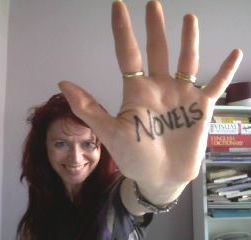 But look at the music industry. Musicians aren’t expected to stay the same. Their fans are far more forgiving when an artiste evolves. Writers, though, don’t get away with it. Why? Because we hide behind our disembodied words, or only emerge in targeted publicity campaigns built like DVD extras around our books. The books build the readership.
But look at the music industry. Musicians aren’t expected to stay the same. Their fans are far more forgiving when an artiste evolves. Writers, though, don’t get away with it. Why? Because we hide behind our disembodied words, or only emerge in targeted publicity campaigns built like DVD extras around our books. The books build the readership.
No room to hide
Of course, our books are what matters. But it seems there’s a danger in letting them do all the talking. It’s even worse if you leave platform-building to someone else, because they become the intermediary between your work and the world. Which might paint you into a very tiny corner.
Building a platform is an extra job. It doesn’t come easily to everyone. Ironically, it’s the genre authors who find it simplest – mainly because there are well defined templates to follow, established groups to hang out with. But if you’re not easily pigeonholed, you need it even more. You need to show people who you are under the books, where you go exploring for ideas. That relationship will keep readers with you when you venture to new places.
Writers now have a fantastic tool to own our creative identity. We can now be like the musicians who aren’t damned for developing or for reinventing ourselves – and indeed are respected for it.
If you know you will always be adding new tools to your repertoire, be stirred by new influences, will change the ways you seek escape and enlightenment – hell, if you might just get older and wiser, you need to build a platform.
It is your ticket to creative freedom.
Thanks for the pic Thuany Gabriela
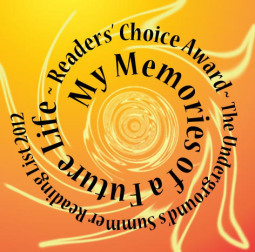
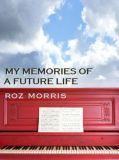 Tiny bit of news. My Memories of a Future Life was nominated for an award at Underground Book Reviews last month – and I’ve just discovered it won a Reader’s Choice award. If you helped by giving it a vote, thank you very much
Tiny bit of news. My Memories of a Future Life was nominated for an award at Underground Book Reviews last month – and I’ve just discovered it won a Reader’s Choice award. If you helped by giving it a vote, thank you very much
Do you think platform is just for one kind of writer and not another? Do you resent having to do it? Do you embrace it? And what are you doing to build it (assuming you are not about to leave a comment screaming ‘NOOOOOOO’)








May 24, 2012
Website of the Week at Writers’ Digest – and now I’ll be quiet for a bit
writing books writing tutorials
how to get published
writing workshops writing contes
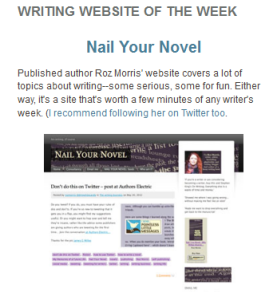 I just got a lovely email from Brian Klems, one of the online editors at Writer’s Digest, telling me Nail Your Novel is the Writer’s Digest Website of the week. This was a complete surprise – and shows you never know who’s reading your rants and divertissements. Anyway, I’m now extremely proud to be squeezing its badge onto my sidebar. (How did it get so stuffed…?)
I just got a lovely email from Brian Klems, one of the online editors at Writer’s Digest, telling me Nail Your Novel is the Writer’s Digest Website of the week. This was a complete surprise – and shows you never know who’s reading your rants and divertissements. Anyway, I’m now extremely proud to be squeezing its badge onto my sidebar. (How did it get so stuffed…?)
It’s not one of those awards I can pass on, obviously, but on the plus side I don’t have to jolly you to read about seven personal habits you never knew I had. Indeed I’ll be a bit quieter than usual until June as I won’t be in grasping distance of a mouse. The Undercover Soundtrack is taking a break too, and will be back on 6/6.
In the meantime I’ve scheduled a rerun of Undercover Soundtrack highlights which you can catch if you follow @ByRozMorris on Twitter, and I’ve prepared a stack of useful writing links to share on @DirtyWhiteCandy. You can also see them streamed here in the ever-growing sidebar (which, yes, I must get round to trimming).
Happy writing, see you soon – and thank you, Writer’s Digest!








May 22, 2012
‘I listened, eyes closed, hands on keys, remembering the *why* of this book’ – Joni Rodgers, The Undercover Soundtrack
 Joni Rodgers was a volunteer with the relief effort after Hurricane Katrina when she had the idea for The Hurricane Lover. The novel came to life over a long, slow period – a whirl of ideas, each falling into place day by day. Very often those insights come in the form of music – for the nature of her characters and for the tumultuous arc of the story itself. Joni Rodgers is at the red blog today drumming up a storm with her Undercover Soundtrack.
Joni Rodgers was a volunteer with the relief effort after Hurricane Katrina when she had the idea for The Hurricane Lover. The novel came to life over a long, slow period – a whirl of ideas, each falling into place day by day. Very often those insights come in the form of music – for the nature of her characters and for the tumultuous arc of the story itself. Joni Rodgers is at the red blog today drumming up a storm with her Undercover Soundtrack.













